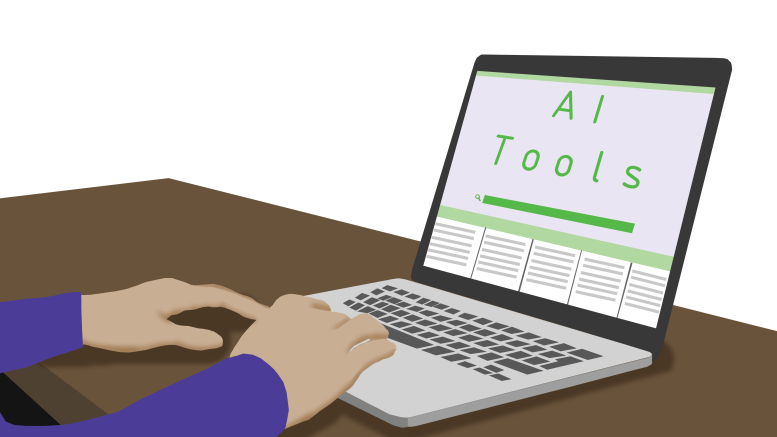Imagine waking up to the news that universities want to ban students from using the internet for assignments, asking students to use physical books and primary documents. That won’t happen — we are meant to move forward with time, not backward.
Similarly, universities are wary of AI, urging students to avoid it. But the truth is, AI will only get more sophisticated and widely used. Instead of avoiding it, universities should embrace AI in courses and work with students to use it meaningfully.
Some of the famous AI tools like ChatGPT by OpenAI are renowned among and used by University of Manitoba students.
AI’s integration into higher education is important to revolutionize teaching methods and student learning. This is a chance for the U of M to develop and be among the first Canadian universities to include AI meaningfully in course work.
A few of my professors have been discussing the guidelines for upcoming research papers, highlighting the inconsistency surrounding AI regulations within university. There are instances where AI is strictly prohibited, while in other cases it’s strongly discouraged.
This inconsistency has made me think how these vague guidelines can adversely impact students, emphasizing the necessity for clear and coherent regulations that are fair and reasonable.
One question that comes up with AI is its ethical use. Educators face this challenge of preparing students to ethically engage with AI, recognizing its current use among students.
Sky News reported that the U.K. based Russell Group of universities released guiding principles, endorsing AI’s “potential to enhance the student learning experience.” They emphasize empowering staff to incorporate creative AI tools in teaching sessions and assessments, ensuring a well-rounded educational approach.
University of Manchester health sciences professor Andrew Brass told Sky News there is a need for collaboration with students in crafting guidelines rather than imposing rules. According to Brass, transparent communication about any limitations on AI use is vital to prevent people finding work-arounds.
Speaking with Sky News, Tim Bradshaw, CEO of Russell Group, emphasized the importance of imparting skills that align with AI advancements, acknowledging its transformative impact on career trajectories. Universities should focus on fostering an understanding of AI and its responsible use for future professional success.
AI has already been revolutionizing education by offering tailored learning experiences through machine learning. It adapts to diverse needs, aiding students with disabilities or unique styles, notably boosting accessibility.
Walden University introduced Julian, an AI-powered tutor, in 2018 to enhance student learning. This tutoring aids in personalized learning that is available at all hours of the day, offering individualized support and adaptive activities. With the help of Google Cloud, Walden innovates by using AI to identify learning gaps and reinforce concepts, foreseeing continuous evolution to meet student needs.
Khan Academy’s Khanmigo is endorsed by its founder and CEO, who envisions AI as education’s greatest positive catalyst. Khanmigo offers personalized tutoring and an AI teaching assistant through adaptive learning.
Universities aim for employability of graduates, well AI is going to be used at workplaces and students should be equipped and ready for it.
In some UK universities’ view, technology is an opportunity for, not a threat to, academic integrity. Guiding principles by these universities prioritize AI literacy and ethical AI integration in teaching and assessments, ensuring equal access while upholding academic rigour. Collaboration among universities aims to share evolving AI best practices for the benefit of students and staff.
University professors nationwide are transforming classrooms in response to ChatGPT, heralding a significant shift in education. Course redesigns feature oral exams, group activities and handwritten assessments instead of work written in word processors. The rapid advancement of generative AI, seen in Google’s LaMDA and Microsoft’s investment in OpenAI, prompts ongoing innovations, necessitating continuous adaptation. This is further proof that AI is here to stay and grow.
The University at Buffalo and Furman University are prioritizing educating students on AI tools in freshman courses. This shows that these universities are aiming to prevent academic integrity issues proactively.
Meanwhile, institutions like Washington University in St. Louis and the University of Vermont are updating plagiarism definitions to encompass generative AI, setting boundaries for its ethical use. These proactive measures aim to pre-empt issues rather than solely reacting to them, emphasizing the evolving landscape of AI in education.
AI brings immense potential to academia but presents challenges, like biased models, errors, plagiarism, and job insecurities for faculty. Institutions must address these hurdles to ensure AI enhances outcomes, aids educators and benefits learners.
Beyond students’ use of AI, the tool can also be used for assessing and predicting student success. Early interventions using technology can prevent academic struggles, reducing dropout rates. Ivy Tech Community College used AI to identify and assist at-risk students, resulting in a significant increase in passing grades, aiding over 34,000 students through their Project Student Success.
With the rise of remote education, AI tools can provide flexible learning experiences for students throughout the world.
Thinking about AI as a new trend is wrong. It is going to be the next big thing in different areas including technology, education, health, war, business, art and every other industry. Universities must prepare students for an AI-influenced world.



